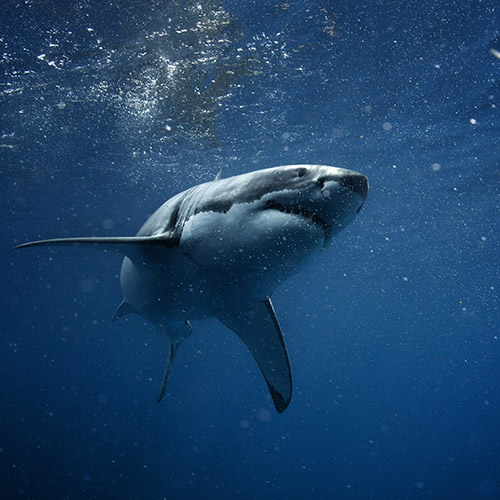26 October 2022

Clean, choppy, or cranking, when the surf’s up, so too are the surfers. But even the most avid surfer would steer clear of the waves when a shark is about… or would they?
In a new study from the University of South Australia, researchers found that 60 per cent of surfers are not afraid of sharks when surfing, despite more than half of them spotting a shark when out in the water.
It’s an interesting finding, particularly given people’s general fascination and fear of sharks, but as behavioural scientist and conservation psychology researcher, UniSA’s Dr Brianna Le Busque, says it’s a step in the right direction when it comes to shark conservation.
“People have long feared sharks - not surprisingly given the hype generated from modern shark movies,” Dr Le Busque says.
“But exaggerated depictions of sharks have unfairly influenced people and as a result, have damaged shark conservation efforts.
“Surfers are frequent ocean users, so they’re in a unique position to change these perceptions.
“Anecdotally, we know that surfers understand the role sharks play in ocean health and, for the most part, believe that shark conservation is good.
“But the relationship between surfers and sharks is complex and has not been widely researched, so understanding their interactions is an important step in shark conservation and management policies.”
Surveying 391 surfers across 24 different countries (predominantly USA), the study found that:
- 60 per cent were not afraid of sharks when surfing
- 52 per cent had seen a shark when surfing
- 44 per cent said a shark sighting would not stop them from going in the water
- 17 per cent had been bitten or personally knew someone who had been bitten by a shark.
Globally, 100 million sharks are killed each year with a quarter of shark species threatened by extinction.
Le Busque says that the study will help to change people’s negative perceptions of sharks.
“Surfers encounter sharks more than any other people in the community; they should be part of the consultation process when it comes to management or mitigation strategies,” Le Busque says.
“When we step into the ocean, we step into their environment. We all need to be appropriately informed to ensure a logical balance between safety and conservation.”
Notes to editors:
- International shark statistics - floridamuseum.ufl.edu/shark-attacks/maps/world/
………………………………………………………………………………………………………………………
Contact for interview: Dr Brianna Le Busque E: Brianna.LeBusque@unisa.edu.au
Media contact: Annabel Mansfield M: +61 479 182 489 E: Annabel.Mansfield@unisa.edu.au




